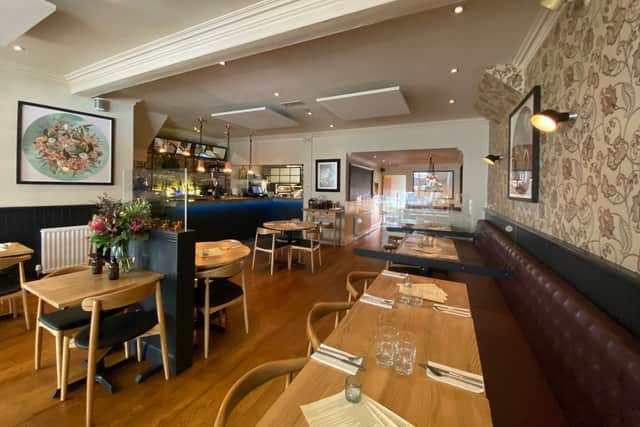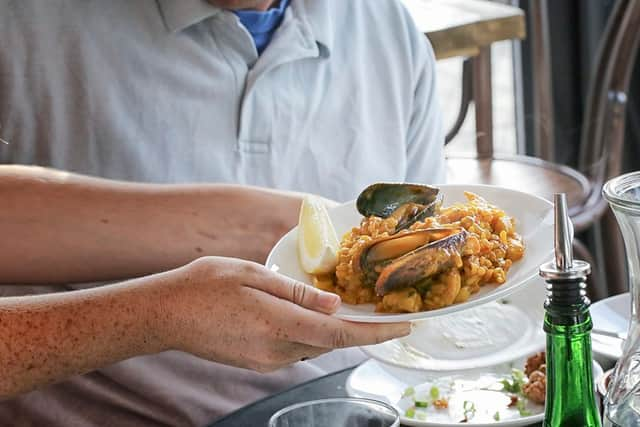Bristol restaurant owners fear for future amid soaring energy and food bills
and live on Freeview channel 276
Like most Bristol restaurant owners Julian Faiello is worried about the winter and rising energy and food bills. “It looks like the perfect storm is coming,” says the co-owner of Italian restaurant Prego on the border of Westbury Park and Henleaze. “We are very concerned about rising bills.”
Julian has run the North View restaurant with business partner Olly Gallery for the past 11 years. In that time, they’ve had to deal with the knock-on effects of Brexit and Covid, but the cost of living crisis is posing an even greater threat to small local restaurants like Prego.
Advertisement
Hide AdAdvertisement
Hide AdCombine the rising costs of energy and the ingredients, with a lack of trained staff and hospitality businesses are facing a bleak winter and beyond.
Julian says Prego is currently on a fixed contract for its fuel, with two years left, but with no cap on commercial energy, what happens next?
“If things keep going the way they are, our bills could be as much as four times higher than they are. Looking ahead, we will probably have to close at the quieter times like lunch, which then means less hours for the staff.”


With fewer customers in a position to eat out as much as they were due to concerns about their own domestic energy bills and stagnant incomes, neighbourhood restaurants like Prego face tough choices. Menu prices will inevitably rise, but there’s only so much extra customers are happy to pay.
Advertisement
Hide AdAdvertisement
Hide AdJulian says: “We have had no choice but to put prices up as food costs have risen drastically. Plus it is getting harder to get products we need from the EU due to red tape at customs.
“Our menu has risen around 10% in price but this no way covers the increase in raw ingredients. And we have already noticed a difference in the way customers dine - the spend per head is noticeably down.
“We offer a set lunch during the lunchtimes we are open as they were getting quieter on Friday and Saturday daytimes when it was not available. We also do an early bird menu Monday to Thursday - we never had to do this before - and now we are seeing diners dropping a starter or dessert on other times so they are spending less.
“I suspect all supplier costs will rise, which will have a knock on effect with menu pricing. Again, there is only so much extra cost we can pass on so we will just have to adsorb them in our profit.”
Advertisement
Hide AdAdvertisement
Hide AdAnd Julian thinks it’s time the government stepped in and offered some help to small businesses like his.
“I believe the government should put a cap on commercial energy just like domestic or VAT reduction. Historically, we have always paid more but now it will untenable for quite a few businesses who are out of contract and now having to renegotiate.”
‘After Covid, the energy crisis is another big blow for hospitality’
Kieran Waite is director of Season and Taste, the Bristol hospitality business that owns several restaurants and bars including Gambas and Cargo Cantina in Cargo, Wapping Wharf, and Bravas on Cotham Hill. Whilst the rising energy and food bills is a concern for Kieran and his partner, Imogen, they are fortunate that the restaurants are on fixed contracts at the moment.
Kieran says: “It’s something we will have to monitor very carefully and manage accordingly but we have some breathing space by being on fixed contracts for electricity and gas.
Advertisement
Hide AdAdvertisement
Hide Ad“I always prefer to focus on solutions over problems so let’s see what opportunities there are to make our businesses more energy efficient and reduce consumption.
“At Bravas, for example, we have always paid a bit more for our energy because we prefer to buy from renewable sources, we have also recently taken advantage of green energy grants to double glaze, improve insulation and fit air curtains that will all affect our carbon footprint and hopefully our costs, too.”


After Covid, the energy crisis is another big blow for hospitality and small businesses so how is Kieran preparing for it and will he have to make drastic changes like reducing opening times or staff?
“We’re not planning to reduce staff or opening hours as a result of the energy crisis. We’re working hard with our teams to make restaurants where people can come for joyful experiences and with careful cost management we expect to carry on as usual.
Advertisement
Hide AdAdvertisement
Hide Ad“Restaurants like ours that change dishes or menus daily are often costing them daily according to market prices. We work on good supplier relationships, and shortening the supply chain or buying from source where we can. We’re working hard for our customers to get the best produce and prices that we can so any impact or increase is minimal.
“I think everyone is making choices to cut their cloth in some areas, but at the moment the people coming to our places are coming for an experience and spend per head remains consistent. We usually see a bit of a downturn in September - back to school often prompts a bit of a food and money diet, and I expect this to last longer than usual.
“The biggest financial support for both the business and the consumers who wish to support our businesses would be to bring back and permanently leave a reduction in VAT.”
‘We’re expecting large rises of 400-500% in some of our sites’
Nathan Lee is one of the founders of Hyde & Co, the award-winning Bristol group behind popular restaurants and bars such as Bambalan, The Ox, Milk Thistle and Seven Lucky Gods. He says he is ‘very concerned’ by the current situation with energy costs and warns that many small businesses will struggle to make any profits at all.
Advertisement
Hide AdAdvertisement
Hide Ad“We’re expecting large rises of 400-500% in some of our sites as they respectively finish their fixed contracts and move onto variable ones,” says Nathan. “We’re doing everything we can to mitigate the cost increases but there’s only so much we can pass onto our customers.
“We’re not planning on reducing trading hours yet but I wouldn’t write it off in the future. It’s similar to the pandemic - if not worse - so we’ll have to hustle and adapt to the ever-changing situation.”


With multiple sites across the city, Hyde & Co also has a huge monthly wage bill to pay and Nathan says that’s another big cost for small businesses.
“The minimum wage went up again in April so that, together with a shortage of staff and the National Insurance increase, has had a knock on effect pushing the cost of employing staff up.
Advertisement
Hide AdAdvertisement
Hide Ad“Basically, the industry is in trouble. It’s not possible to pass on all the costs so we will have to absorb some of them. The only problem with that is the margins are so slim in our industry that this will push most businesses into making a loss rather than profit.”
And Nathan thinks the worst is still to come as customers have yet to really notice too much change with their bills, although they will before Christmas.
“I don’t think the consumer has been hugely affected yet. That will come when the winter bills land and the reality of the situation will become more apparent. Put it this way, I’m not expecting a busy period from January to March 2023 but we’re ploughing ahead with Christmas and bookings are coming in thick and fast. We really do need a good Christmas as the last two years were massively affected by Covid.
“I think the government is going to be forced to do something similar to the pandemic measures - a reduction in VAT, suspension of business rates and targeted grants are going to be needed if they want hospitality businesses to survive.
Advertisement
Hide AdAdvertisement
Hide Ad“We’re part of the food chain, if we go then so do the jobs, suppliers, loan repayments. The problem is that we’re all still paying off the debt we took on to survive the pandemic. If the government does nothing then it risks wasting all that support.”
Comment Guidelines
National World encourages reader discussion on our stories. User feedback, insights and back-and-forth exchanges add a rich layer of context to reporting. Please review our Community Guidelines before commenting.
